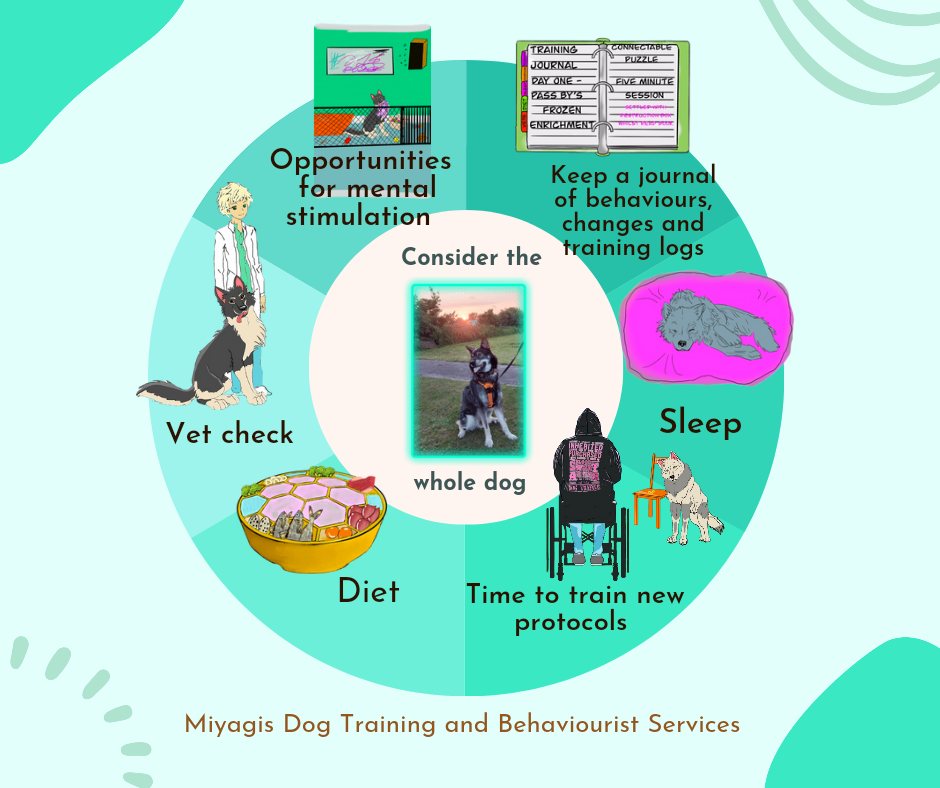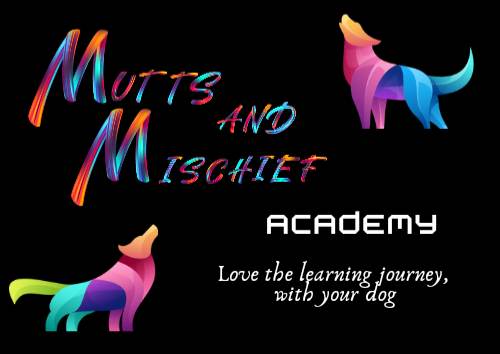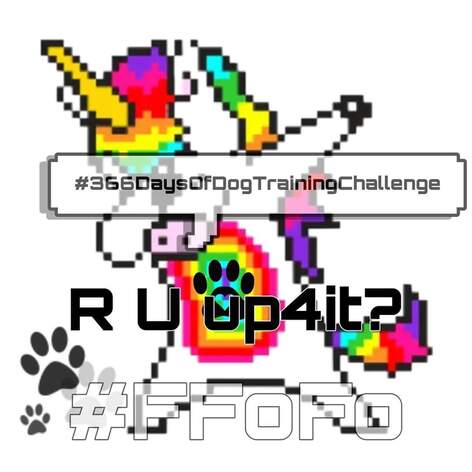|
Importance of keeping journals
Some people might find it odd when we request that owners (guardians) are asked to keep a journal of their dogs' behaviour. We also keep journals for logging training sessions, the criteria (the aim) and the behaviour (such as a "sit cue" for example). Some are basic and some are complex, some like to document times of starts and finishing and duration or duration of each behaviour and how it went, the dogs responses, treats used and what can be improved. But for owners there are a few benefits to keeping journals for both you and your dog. During a study researchers found that journalling and expressing emotions helped the writer both physically and mentally within a duration of 15-20 minutes. Although the participants felt distress at the time of writing, they did report feeling better later and found the experience meaningful and valuable. Pennebaker, J. W. (1997b) Every single dog owner (guardian) has emotional feelings about their dog, whether this be negative or positive or indifferent, but this is aimed at the owners (guardians) who see their dog as a beloved member of the family and not with indifference. When we love our dogs, this means we open up our heart (or brain - but let's not get too technical) and with this love comes a lot of feelings. We can feel rushes of joy, excitement, overwhelming love, happiness, contentment, a euphoric high etc but sometimes the downside of love or being human with big emotions just like our dogs, we can feel overwhelmed, guilty, embarrassed, upset, hurt, frustrated, lost and not knowing what to do or where to turn. Were humans and even if you don't connect with all of the negative words above (I don't connect with all of them) it is OK to feel crap and I promise you, it's not just owners (guardians) who feel crap, it's us professionals too, whether this be being guardians to our own dogs, work or our emotional buckets being full from social media etc. So there are two major components to keeping a journal as an owner (guardian), the first is you can keep a journal of your training sessions and walks and reflect, which honestly makes you feel good when you see your progress. The second is why we ask you to journal: we ask you to journal to note your dogs behaviours, such as separation anxiety, reactivity, eating patterns, toileting patterns, mood, general behaviour, sleep patterns, enrichment opportunities and their responses, responses to walks, harnesses, interactions with people and other dogs. This is a very broad cross section and no two owners will have the same journaling process, because all dogs are individuals. Keeping a journal means together we can look at your dogs behaviour and begin to see a pattern or if not a pattern be able to narrow down what might be causing your dogs behaviour. Some people might think this is great and love journaling and might even have an aesthetic instagram account all about journaling. Joking aside, some people may dread it and feel overwhelmed for a variety of reasons, we don't judge, it's not our place to judge. Some ways that might benefit someone with journaling who feels they may struggle is a text message, speech to text, slang, urban dictionary, even voice recording. It's not for us to dictate to you how to journal and it doesn't have to be a fancy journal or the latest Microsoft program. We don't even have to see it, much like therapy, your journal is private and you can simply read out the main points. But as well as helping your dog and your relationship with your dog, you will be able to enjoy physical health benefits such as fewer stress related visits to the doctor, improved breathing, healthier liver, improved mood, reduction in depressive symptoms and overall feeling better, based on 4 months of regular journalling. Pennebaker, J. W. & Francis, M. E. (1996) These were results from both the laboratory and self reported outcomes from the individuals, this established that individuals found that by journalling there was less chance of developing stress related diseases by not confronting emotionally stressful events and immune system and physical improvements within the body. As well as being able to compartmentalise the traumatic memory and detach from it and have improved cognitive function when analysing yourself and others. Pennebaker, J. W., Kiecolt-Glaser, J. K. & Glaser, R. (1988) Dogs are individuals with complex behavioural patterns and emotional needs. Cooper et al, (2003). Researchers gather data about dogs and their owners (guardians) by doing surveys and directly working with a sample of dogs and owners (guardians) at a research facility. Through doing this both researchers and we can learn more about dogs and you! Researchers have found that by applying human psychology to owners we can better help the dog, we do this by gaining an insight into your relationship and mechanics of your day to day life - journaling. Dog welfare is dependent on interactions from the owner (guardian) Hiby et al, (2004). Serpell, (2019) and learning about owners expectations of their dogs and interpretations of body language and Behaviour and how owners respond to behaviours deemed as undesirable. A.Horowitz, (2004). By providing owners (guardians) with more knowledge the more owners will understand dog cognition and skilled care providers for dogs, adapting a dog parenting style may best help the dog. Van Herwijnen. I. R. (2020) Both ends of the lead are important despite what you may have heard in the past, we as professionals can better help your dog, their welfare and biological needs by educating owners (guardians) to the best of our abilities, ensuring you both are well and healthy both physically and mentally and this is why journals are so important for you both (or all if you have several dogs). References Pennebaker, J. W. (1997b) Writing about emotional experiences as a therapeutic process. Psychological Science, 8, 162–166. Pennebaker, J. W. & Francis, M. E. (1996) Cognitive, emotional, and language processes in disclosure. Cognition and Emotion, 10, 601–626. Pennebaker, J. W., Kiecolt-Glaser, J. K. & Glaser, R. (1988) Disclosure of traumas and immune function. Health implications for psychotherapy. Journal of Consulting and Clinical Psychology, 56, 239–245. Baikie, K., & Wilhelm, K. (2005). Emotional and physical health benefits of expressive writing. Advances in Psychiatric Treatment, 11(5), 338-346. doi:10.1192/apt.11.5.338 Cooper, J. J., C. Ashton, S. Bishop, R. West, D. S. Mills, and R. J. Young. 2003. Clever Hounds: Social Cognition in the Domestic Dog (Canis familiaris). Applied Animal Behaviour Science 81:229–244 Hiby, E.F., Rooney, N.J. & Bradshaw, J.W.S. (2004). Dog training methods: their use, effectiveness and interaction with behaviour and welfare. — Anim. Welf. 13: 63-70. Serpell, J.A. (2019). How happy is your pet? The problem of subjectivity in the assessment of companion animal welfare. — Anim. Welf. 28: 57-66. Horowitz, A. (2009). Disambiguating the “guilty look”: salient prompts to a familiar dog behaviour. — Behav. Process. 81: 447-452. Van Herwijnen. I. R. (2020) Educating dog owners: how owner–dog interactions can benefit from addressing the human caregiving system and dog-directed parenting styles Image description: a mint green background with a shaded green category circle. Within the categories are sleep, with a grey wolf dog sleeping on a pink bed. A Wheelchair user with their back to the screen playing the chair game with a cream and grey wolfdog with the category title of "Time to train new protocols." A category called "diet" with the sodapup honeycomb slow feeder with raw food in the centre with vegetables, fish, liver and eggs in the outer of the bowl. A Vet with blonde short hair, white medical coat and green scrubs stood with a dark grey and tan Wolfdog with the category "vet check". A category called opportunities for mental enrichment with a dark grey and tan Wolfdog behind an xpen fence, within a Doggy Enrichment Land. A green wall with the bottom of a picture frame and a music speaker. There is a destruction box filled with balls, a Kong, a lickimat, a snuffle mat, an orange bed, a bone, an ostrich twist and a loose ball. The last category is "Keep a journal" with a lined journal with green edges and rainbow dividers.
0 Comments
Leave a Reply. |
BlogFor Mutts & Mischief If you enjoy my blogs and
would like to support my work, you can support me by buying me a Coffee! Archives
March 2024
|
Or are you looking for support and would like to get to know us better?
If the answer is yes then click the image below to join my free facebook group. What is Mutts & Mischief Community?
So it is what it says on the tin! Its a community that is international of Clients and Colleagues with the most supportive and friendly people on the planet. Dog Trainers and Behaviourists from all over the world!
Why did I set up such a mammoth group?
I wanted to have a group exclusively for Clients. For support and to meet uo and build on friendships from Classes or One to Ones. I want Clients to see you are not alone with your Dog and the problem you maybe having that you are not the first and won't be the last! I wanted a safe place where Clients could trade stories good and bad in one place for free!
I also wanted a safe place for the Trainers and Behaviourists I mentor within Social Media Platforms.
Why do this for free?
Because when I say I offer an holistic service I really do. It isn't about the money it is about you and your dogs. You and your dogs are all that matter.
So I wanted to encourage people to do homework and build better quality relationships with their dogs. So 3 years ago I had a mad idea and set up the 100 days of dog training challenge. Once a day people would spend 5 minutes plus training their dog. Recording it and uploading their video onto the Community. Every participant recieved a Certificate.
What I didn't count on was how many Professionals wanted to join and how fast word would spread. So this year 2020 I set up a 366 days of dog training challenge.
We have Clients in America, Greece, Norway, Denmark and Spain. We have Trainers from Greece, Norway, Isle of Wight, America and many more Countries. As well as dog trainers and trainee behaviourists: I mentor all over the world.
So again yes this group is free. It is still primarily for clients and for people to get to know me but we also have the challenge running. Again for free. So if you want to join click the image below to be taken to the group directly. See you there!
So it is what it says on the tin! Its a community that is international of Clients and Colleagues with the most supportive and friendly people on the planet. Dog Trainers and Behaviourists from all over the world!
Why did I set up such a mammoth group?
I wanted to have a group exclusively for Clients. For support and to meet uo and build on friendships from Classes or One to Ones. I want Clients to see you are not alone with your Dog and the problem you maybe having that you are not the first and won't be the last! I wanted a safe place where Clients could trade stories good and bad in one place for free!
I also wanted a safe place for the Trainers and Behaviourists I mentor within Social Media Platforms.
Why do this for free?
Because when I say I offer an holistic service I really do. It isn't about the money it is about you and your dogs. You and your dogs are all that matter.
So I wanted to encourage people to do homework and build better quality relationships with their dogs. So 3 years ago I had a mad idea and set up the 100 days of dog training challenge. Once a day people would spend 5 minutes plus training their dog. Recording it and uploading their video onto the Community. Every participant recieved a Certificate.
What I didn't count on was how many Professionals wanted to join and how fast word would spread. So this year 2020 I set up a 366 days of dog training challenge.
We have Clients in America, Greece, Norway, Denmark and Spain. We have Trainers from Greece, Norway, Isle of Wight, America and many more Countries. As well as dog trainers and trainee behaviourists: I mentor all over the world.
So again yes this group is free. It is still primarily for clients and for people to get to know me but we also have the challenge running. Again for free. So if you want to join click the image below to be taken to the group directly. See you there!
Proudly powered by Weebly



